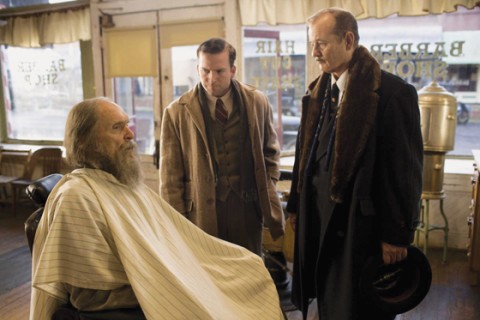Get Low

Get Low is a redemption story that doesn't feel hollow or fake. That's mostly because the protagonist, a Depression-era small-town Tennessee recluse named Felix Bush, is played by Robert Duvall in a wildly imaginative performance that may be the finest he's ever turned in.
Duvall's film career spans more than four decades, and he's won a pile of accolades, including an Oscar for Tender Mercies, another redemption parable. However, he's usually been more authentic in supporting roles, many of them unforgettable; when he stretches out, he tends to force his effects.
Read our latest issue or browse back issues.
But Duvall doesn't strike a false moment in his portrayal of Felix, a grizzled cuss with a bogeyman myth around him. Felix hatches a bizarre plan: to throw himself an elaborate funeral party before the fact, at which his neighbors are invited to tell stories about him. Bill Murray plays Frank Quinn, a sardonic undertaker who's only too glad to accept Felix's proposition since, as he observes to his young assistant Buddy (Lucas Black), he's that rare funeral director whose business, against the dictates of nature, has fallen on hard times. Under Frank's guidance, the fete becomes a lottery with the winner set to inherit Felix's land.
The movie is a complicated tall tale with a constantly shifting tone. The screenplay, by Chris Provenzano and C. Gaby Mitchell, is so ambitious and unconventional that one marvels it ever got made, and director Aaron Schneider strives to remain faithful to its complexity. It begins as a somber modern-day western with a frightening oddball antihero and then edges into comedy when Felix lays out his scenario to an eager Frank.
Murray provides some deadpan irony; at first his casting is puzzling, but his responses to Duvall's Felix have a leavening effect on the movie, and he's a splendidly understated actor. When Sissy Spacek enters as Mattie, a recent widow who's returned to the town where she was Felix's sweetheart many years ago, longing and nostalgia are added to the equation. Mattie sees straight through Felix's eccentricities to the young man she was once in love with, and her view of him has the effect of humanizing him for us—plus he reverts to a softer persona when he's around her, as if he's reflecting back the way she sees him.
Bill Cobbs shows up as a minister who oversees a church Felix built with his own hands—he's a longtime friend Felix needs at the proceedings to supply a bridge to the life he once led. Each of these characters reveals another side of the old reprobate, and his interaction with each alters the way he begins to envision his supposed funeral party. (All the performances are excellent, though Black's conscientiousness about replicating a deep Tennessee accent backfires: his is so pronounced that he seems to come from a locale different from everyone else's.)
Get Low has many wonderful scenes, but it doesn't quite come together. Part of the problem is the clumsy, lumbering way Provenzano and Mitchell unveil Felix's past. By the time we find out what's haunted him all these years, it doesn't seem to be a big enough deal to explain the dark legend that's hovered over him.
But the climactic sequence in which Felix makes his story public for the first time unleashes Duvall's vibrancy and power. When he gives testimony about the sin that's blighted his life, his confessional intensity is greater than anything the actor has displayed before—even in The Apostle, in which he played a preacher.
The film is about owning up to your own life, something not only Felix, but all the main characters end up having to do. Mattie has to come to terms with what remains for her after the loss of her husband. As for the cynical veteran undertaker and his assistant, their acquaintance with Felix provokes them both to ponder whether they are men of moral worth. Get Low doesn't follow the path you expect, and the one it does pursue is somewhat tortuous, but at the end you feel you've been somewhere new.






